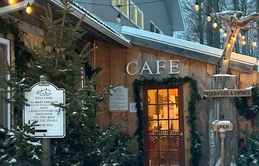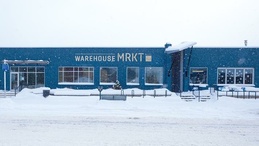
Black Star Farms' Half-million Dollar Flash Détente
The Future of the North's Red Wine?
By Ross Boissoneau | Feb. 17, 2018
Northwestern lower Michigan is well-known for its wine, but the weather can throw a wrench into the works. Frigid winters, late frosts, or summer storms can damage, even destroy an entire year’s crop. Witness the harvests — or lack thereof — in 2014 and 2015.
Even in those years where there is a good harvest, weather variations can impact the grapes and prevent the resulting wine from reaching its peak. That’s especially true of reds, which require a longer, warmer growing season than white wine grapes.
Enter the Flash Détente. While the process has been around for nearly 20 years, it’s been more readily adapted overseas than in the U.S. That’s slowly starting to change, as wineries in California and Texas are among those opting to shell out the nearly half-million dollars for the system.
Black Star Farms added itself to that exclusive club, recently bringing in a Flash Détente to help boost the quality of its award-winning wines.
“It breaks down the cell structure and releases everything the grape has,” said Lee Lutes (pictured above), chief winemaker for the Black Star’s winery. “It’s a new tool in the kitchen. Let’s see what we can make.”
HOW IT WORKS
The machinery is complex, but the process is relatively straightforward: The grapes are heated to a temperature between 175 and 185 degrees, then immediately pumped into a vacuum chamber. There, the flash vaporization of water inside the grape skins causes the vacuoles to explode, releasing all of the pigments. The process eliminates any green, vegetal flavors associated with under-ripeness and other undesirable characteristics, and, as a bonus, provides greater color to the juice.
“We’re a mid-continental maritime climate. We get a lot of factors that make it challenging for red wine (production),” Lutes said. Last year, for example, was cool until the 90-degree temperatures in September, which basically saved the reds’ season. “We would have been struggling without September to get reds. We have growing seasons like that.”
“It mitigates the weather,” added Sherri Campbell Fenton, the director of communications and public affairs for Black Star Farms. “We have shorter seasons, cooler falls — there are more variables here.”
It’s not just about Black Star Farms. Lutes is sharing the process with other winemakers from across the state. “It could be a really big deal for Michigan,” said Karel Bush, executive director of the Michigan Grape and Wine Industry Council.
The investment was steep. The equipment sells for nearly a half-million dollars. Even with a grant providing nearly half the funding, that’s still a hefty chunk of change. Plus there is an investment in the facility to house the equipment, and in the training of staff. “They’re taking a risk, but it’s been around. They did their homework,” said Bush.
TESTED, APPROVED
She said St. Julian Winery from Paw Paw, Michigan, processed some of its grapes through the Flash Détente and is now considering adding the mechanism to its arsenal. Because St. Julian is a large processor, the company could afford to truck its grapes to Black Star and back, said Bush, but that’s impractical for smaller processors. Should St. Julian make the investment, it could provide processing for other wineries in southern Michigan.
Bush said Lutes and Rick Jones from Black Star are showcasing the impact of the Flash Détente at the council’s annual conference the end of this month. They’ll offer a with/without wine tasting — presenting wines processed through the machinery against wines processed normally. Bush said this will be an opportunity for 70 to 80 vintners, processors, and owners to taste for themselves and gauge the impact of the process. “They’ll realize how they might be able to use the service,” she said.
Lutes said he is just starting to scratch the surface of what it can do. He cited the processing of Frontenac as a wine that he said will really benefit from the Flash Détente. “[A Frontenac grape is] kind of an odd fruit. When it’s really ripe, it’s got some bizarre flavors. The best way to process it is before it gets too ripe.
“It’s one more way to overcome the challenges of Mother Nature,” he continued. The longtime winemaker calls his chosen profession a constant challenge. “I’ve been making wine for 25 years in northern Michigan, and I still haven’t seen everything.”
Trending

Welcoming the Winter Solstice: Rituals & Events for the Shortest Day of the Year
With the winter solstice quickly approaching, it’s hard not to notice how dark each day feels. Astronomically, this is… Read More >>
Camp Greilick Now Open!
It’s been a long road for the century-old Camp Greilick, which, after several dormant years, was acquired by Grand Tra… Read More >>
Men and Ugly Sweaters
Those two things don’t always go together, but on Dec. 19, you’ll see both out and about in Petoskey and Harbor … Read More >>


